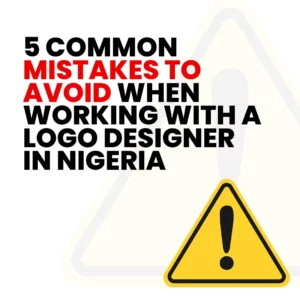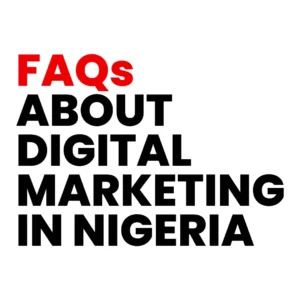In Nigeria, ecommerce has become more popular in recent years, giving companies and consumers new ways to do business. In this article, we’ll talk about ecommerce website development in Nigeria and why you should care about it as a business owner. We’ll take you on a journey to help you learn about the Nigerian eCommerce market, the most important things to think about when making ecommerce sites, and the steps you need to take to make your own online shop. So, if you want to learn how to get around in the exciting world of ecommerce in Nigeria, keep reading and prepare to open up new doors for yourself and your business.
Understanding the Nigerian eCommerce Market
Before starting an ecommerce business in Nigeria, knowing how the market works is crucial. There are a lot of people who might buy from your online business. Nigerians like easy shopping, and e-commerce has grown rapidly in the past few years.
As you move into eCommerce, knowing what Nigerians buy and how they like to shop is essential. They like electronics, clothes, beauty products, and delivery services. Many Nigerians like cash-on-delivery, which lets them pay for their orders when brought to them.
In online shopping in Nigeria, you are not alone. There are several prominent online players, like Jumia and Konga, whose names are known and trusted. These businesses paved the way for e-commerce in Nigeria and built a solid customer base. You can find your niche and draw customers with unique products or services.

Key Considerations for E-commerce Website Development in Nigeria
There are a few essential things to consider when making your own ecommerce website in Nigeria.
1. Choosing the right e-commerce platform
Your online business will only do well if you choose the right e-commerce site. You want a tool that is easy to use, adaptable, and can be changed to fit your needs. Shopify, WooCommerce, and Magento are all popular ecommerce systems in Nigeria. These platforms give you ready-made models and tools that make setting up and running an online store easy.
2. Payment gateways and integration on a local level
Nigerians have their favourite ways to pay, so it is vital to give them a choice. By integrating local payment systems like Interswitch, Flutterwave, or Paystack, your customers can pay quickly with debit cards, bank transfers, or mobile wallets. Ensure your e-commerce website supports these payment gateways for a smooth checkout.
3. Responsiveness and optimization for mobile
In Nigeria, many people use their cell phones to connect to the internet. So, it is vital that your eCommerce site works well on mobile devices and is adaptable. This means it should work well on devices with different screen sizes and load quickly. Making sure your website works well on mobile devices makes it easy for potential buyers to look around and buy things from their phones.
4. User-friendly interface and navigation
Your website for online shopping should be easy to use and understand. Use menus, categories, and filters that are easy to understand and use to help users find goods quickly. Ensure your product pages have full descriptions, high-quality images, and customer reviews to build trust and help people decide.
5. Support for many languages and currencies
Nigeria has many different languages, cultures, and ways of life. To reach more people with your website, offer help in multiple languages. Support for various currencies also lets customers see prices and make purchases in their chosen currency, making things easier and more comfortable for them.
6. Measures for security and privacy
It is vital to protect the protection and privacy of your customers’ information. Invest in secure hosting, SSL certificates, and encryption technologies to protect private information like credit card details. To build trust with your customers, show trust badges and explain your privacy policy clearly.
By keeping these key things in mind when building your ecommerce website, you can make an online store that is easy to use, safe, and meets the needs and expectations of Nigerian customers. Remember that in the competitive world of e-commerce, you can draw and keep customers by making shopping easy and enjoyable.
Read Also: How to Create a Successful Content Marketing Strategy for SEO in Nigeria
How to Develop an E-commerce Website in Nigeria
Now that you know the most important things to consider when making an ecommerce website in Nigeria, let’s go over the step-by-step process of making your own online store. We’ll break it down into easy steps so you can understand it better.
1. Define your business’s goals and the people you want to reach
Before you start making your ecommerce website, you should know what your business goals are. What will you sell or do for people? Who are you trying to reach? Knowing your goals and who you want to reach will help you make better choices as you develop.
2. Do market research and an analysis of your competitors
Research the business and look at what your competitors are doing. Find out what differentiates your goods or services from your competitors and find ways to stand out. Knowing your market lets you make intelligent choices and build a solid online presence.
3. Create a website layout that looks good and works well.
The way your website looks is significant for getting and keeping people. Choose a style that looks good and fits with your brand’s image. Make sure your website is easy to use by having clear menus, a search function, and product groups that are easy to find. To show off your goods well, use high-quality images and exciting text.
4. Set up the most critical features and functions
Your e-commerce website needs to have certain features and functions for shopping to go smoothly. These include a shopping cart, a list of products, a way for customers to sign up, and a way for customers to log in. Consider adding customer reviews, wish lists, and ideas for similar products to keep people interested.
5. Ensure payment gateways and shipping options work together.
Integrate famous local payment gateways like Paystack into your website to make it easier for people to do business online. This lets your customers pay safely in the way they prefer. Also, set up shipping choices and give clear information about shipping costs, delivery times, and tracking services.
6. Test and improve the performance of your website.
Before you open your ecommerce site to the public, you should test it carefully to ensure everything works as it should. Check for any bugs, lost links, or other mistakes. Check how well your website works on various platforms, browsers, and screen sizes. Improve the user experience and reduce customer dissatisfaction by ensuring your website loads quickly.
By following these steps, you can make an ecommerce website that works well and is easy for Nigerian buyers to use. Remember that building an online store is a process that never ends. Always ask customers for comments, keep an eye on your website’s analytics, and make any needed changes to improve your website’s performance and help your business grow.
How to Promote Your Ecommerce Website in Nigeria
Congratulations on getting your ecommerce site up and running in Nigeria! Now it is time to tell people about your online store and bring people there. Let’s look at some simple but effective ways to sell and promote your business that will help it grow.
Create an effective digital marketing plan
For reaching your target group online, digital marketing is a must. Start by making your website and social media sites more engaging. Write helpful blog posts, share videos of your products, and give practical tips about your products or business. Use social media like Facebook, Instagram, and Twitter to connect with your audience and promote your goods.
Use social media and marketing through influencers
Social media is a great way to spread the word about your e-commerce business. Make posts that people will want to read, share news about your products, and talk to your fans. Think about working with writers or people with many followers in your target market who are known as “influencers.” They can help you get the word out about your goods and reach more people.
Search Engine Optimisation (SEO) to help your website rank high on search engines
Make sure that search engines can find your ecommerce site. Use relevant terms in your product descriptions, titles, and meta tags to help search engines find your website. This will make it easier for people looking for goods or services related to your business to find your website.
Online advertising and paid campaigns
You could advertise online to get more people to visit your website. You can make sure that the right people see your ads by using tools like Google Ads and ads on social media that let you target specific demographics and hobbies. Set a budget, decide on your target group, and make ads that stand out to get people to visit your website.
Use email marketing and customer interaction to your advantage
Get email addresses from customers and use them to make an email marketing list. Send regular newsletters or promotional emails to customers to inform them about new goods, sales, or other special offers. Personalize your emails to make your customers feel important and get them to buy from you again.
Remember that promoting and selling your ecommerce site is an ongoing process. Review your marketing efforts often and make changes based on what your customers say and how the market moves. Keep an eye on your website’s data to learn how customers act so you can improve your marketing efforts.
Using these marketing and promotion tactics, you can get more people to visit your website, get more customers, and grow your Nigerian ecommerce business. Keep your marketing strategies the same, be creative, and change them to meet the wants of your target audience.
Common Problems With Ecommerce Website Development in Nigeria
Creating an ecommerce site in Nigeria can open up many doors for you, but it is essential to know what difficulties you might face along the way. Understanding and getting ready for these problems will help you better understand the eCommerce world. Let’s look at some of the most common issues you may face.
Problems with infrastructure and logistics
Nigeria has problems with its infrastructure, like power outages and slows Internet connections in some places. These problems can affect how well a website works and online deals go. You should spend money on a trusted web host and tweak your site so it loads faster. Also, work with logistics companies to ensure orders are timely.
Trust and Safety Concerns
Trust and safety are important for the success of any website that sells things online. Some buyers might be worried about giving out personal information or making payments online. Build trust by showing trust badges, making sure payment gateways are safe, and putting customer reviews and testimonials in a visible place. Ensure you protect data privacy and use strong security steps to protect customer information.
Customer service and after-sale support
To build an excellent e-commerce business, you must ensure your customers are happy. But it can take a lot of work to provide reliable customer service. You need to set aside resources to quickly answer customer questions, solve customer problems, and provide good after-sales service. Consider adding live chat support, a customer service hotline, or email help to answer questions and address customer concerns.
Payment problems and stop fraud
Nigeria’s payment system can be hard to figure out. Some customers may need help paying online or would rather pay cash on delivery. Integrate well-known local payment methods and give people different ways to pay to meet their needs. Put in place ways to stop fraud, like monitoring and verification tools for transactions, to protect your customers and your business.
How to Solve Problems With Ecommerce Website Development in Nigeria
Even though building an ecommerce website in Nigeria may have its challenges, it is essential to remember that with the right attitude and strategies, you can overcome them and build a successful online business. Let’s look at some useful things you can do to deal with and get past these problems.
1. Problems with infrastructure and logistics
Choose a reliable web host with a good track record of uptime and speed to get around infrastructure problems. You can make your website run faster by compressing pictures, shortening code, and using caching. Also, work with logistics companies with a good reputation, a strong delivery network, and a good service history.
2. Taking care of trust and safety concerns
It is vital to build trust with your business. Put trust badges and security certificates on your website to show customers that their information is safe. Ensure your privacy policy is clear and your payment methods are secure. Update your website’s security steps often to protect your customers’ information from hackers.
3. Providing good customer service and service after the sale
Invest in customer support tools so you can reliably help customers. Set up a live chat function so that you can answer customer questions right away. Set up straightforward ways for customers to talk to you, like a customer service number or email support, and train your support team to deal with customer issues well. Respond quickly to questions and comments to show you care about your customers.
4. How to get around payment problems and stop fraud
To solve payment problems, add more ways to pay, like local payment methods and cash-on-delivery. Tell your customers the benefits of safe online payments and what you’ve done to ensure they’re safe. Put measures to stop fraud, like monitoring and verification tools for transactions, to protect your customers and your business.
5. Continuous learning and adaptation
E-commerce is a changing field, so keeping up with the latest best practices and trends is important. Attend webinars, workshops, or courses that will help you learn more. Join online groups and forums where people share their stories and where you can learn from them. Adopt an attitude of learning and changing all the time to keep your ecommerce site current and competitive.
Always remember that difficulties are a part of any business journey; to overcome them, you must be persistent and strong. Think of problems as chances to grow and get better. Get help from successful business owners, network with people in your field, and use the tools you have at your disposal to overcome problems and make your e-commerce website a success.
By using these tips and keeping a positive attitude, you can get through the difficulties of ecommerce website creation in Nigeria and build a successful online business. Enjoy the journey, keep your mind on the task at hand, and keep moving forward, knowing that every challenge is a chance to grow.
Successful Ecommerce Websites in Nigeria
Real-life examples can be an excellent way to learn how great ecommerce websites in Nigeria have done what they set out to do. Let’s look at a few case studies of well-known ecommerce sites in Nigeria to give you ideas and help you along your own path.
Jumia

Jumia is one of the biggest ecommerce sites in Nigeria. It has many goods, including electronics, clothing, home appliances, and more. They have done an excellent job of building a strong brand and getting Nigerian customers to trust it. Jumia is successful because it has a wide range of products, affordable prices, and good marketing strategies. They have added things like customer reviews, safe ways to pay, and reliable delivery services to make shopping as easy as possible.
Konga

Another popular ecommerce site in Nigeria is Konga, known for its wide range of products and focus on the customer. They have become known as a one-stop shop for fashion, technology, beauty products, and home appliances, among other things. Konga wants its customers to be happy, offering solid customer service, fast delivery, and many ways to pay. They have also used social media marketing and partnerships with influencers to get more people to know about their business.
Payporte
Payporte is a Nigerian ecommerce site that sells goods related to fashion and lifestyle. They’ve done well to meet the rising demand for fashionable clothes and accessories. Payporte stands out because it has exclusive deals, unique fashion styles, and an easy-to-use interface. They have also used social media to connect with their target audience, run marketing efforts, and get more people to visit their website.
These case studies show how successful ecommerce websites in Nigeria use different approaches and tactics. By looking at how they do things, you can learn how to choose the right products, connect with customers, use marketing methods, and run your business well. Remember that every success story is different, and changing your learning is vital to fit your business plan and audience.
As you start with e-commerce, you can learn from these case studies, but you should also focus on making your unique value offer. Know who you want to sell to, provide good items, give excellent customer service, and keep changing your strategies based on what your customers say and what the market is doing. You can set the stage for a great ecommerce website in Nigeria if you stay informed and use good strategies.
Read Also: What Are the Features of a Great Website Homepage?
Cost of E-commerce Website Development in Nigeria
When making an ecommerce site in Nigeria, one of the most important things to consider is how much it will cost. Knowing the different parts that make up the total cost can help you make a good plan for your budget. Let’s look at the main factors affecting how much it costs to build an ecommerce website.
Website design and development
Your online business is based on how well your e-commerce website is designed and built. The price can change based on how complicated the design is, how many pages are needed, and what functions are required. Hiring a professional web developer or a web development firm can ensure you have a good website, but it may cost more than using a website builder or a template. Web developers in Nigeria charge from ₦200,000 to as much as ₦900,000 depending on several factors.
Web hosting and domain names
You need web hosting services and a domain name for people to be able to find your website online. How much web hosting costs relies on storage space, bandwidth, and how well the server works. In the same way, the price of a domain name can change based on how well-known it is and what kind of ending it has (.com,.ng, etc.). Consider picking a reputable server company and a domain name that fits your brand. The cost of hosting a website in Nigeria ranges from ₦30,000 to ₦300,000, while the cost of domain names costs between ₦1,000 and ₦10,500 annually.
E-commerce platform
Managing your online store well requires that you choose the right e-commerce software. WooCommerce, Shopify, and Magento are all well-known ecommerce systems in Nigeria. The price can change based on the platform’s benefits, ability to grow, and ability to be customized. Some platforms have free choices, but premium themes, plugins, or extensions may cost extra.
Integration of payment gateways
When you add safe payment gateways to your ecommerce site, you may have to pay setup or transaction fees. It is essential to consider these costs and choose a payment method that fits the needs of your business and makes it easy and safe for your customers to pay. Most payment gateways (like Paystack) charge a percentage of the price you sell your goods instead of a subscription fee.
Maintenance and updates
After you launch your e-commerce website, it will need regular care and updates to keep running smoothly. This could include security changes, fixing bugs, and adding new features. Depending on your tech savvy, you may need to hire a web developer or work with a web development firm to do these things. When making a budget, it is essential to consider how much upkeep and updates will cost. The cost of maintenance of an e-commerce website ranges from between ₦14,000 and ₦150,000 annually.
Promotion and marketing
Even though marketing and promotion have nothing to do with building a website, they are important for getting people to visit and making sales. Consider setting aside some of your budget for digital marketing activities like advertising on social media, search engine optimization (SEO), creating content, and working with influencers. The cost will depend on how big and how far you want to go with your marketing.
Remember that putting money into a well-designed and useful eCommerce website can pay off in the form of more sales and growth for your business. To make a successful ecommerce website in Nigeria, you should plan your budget carefully, weigh the costs against the possible benefits, and make choices based on what you know.
Hire an Ecommerce Web Developer in Nigeria
As a skilled web developer in Nigeria, I know how important it is to build ecommerce websites and how hard it can be to do so. Now that you know more about how to build an ecommerce website, it is time to put what you’ve learned to use. I can help you build your own ecommerce site or make changes to your existing one. As a skilled web developer who knows how to make e-commerce sites that look good, are easy to use, and are safe, I am dedicated to making your ideas come to life. I have the knowledge and experience to meet your needs, whether you need a custom website design, easy payment integration, search engine optimization, or ongoing website upkeep. I know how businesses in Nigeria work and can help you find answers that work for your industry and your customers.
Take advantage of the great chances that the booming ecommerce market in Nigeria offers. Contacting me today is the first step you need to take to build your online profile. We can work together to create an e-commerce site that helps you reach your goals and goes above and beyond your customers’ expectations. Remember that a well-made e-commerce site is the key to your success in the digital age. Let’s work together to make an online platform that boosts sales, keeps customers interested, and helps your business grow and succeed. Contact me immediately to discuss how I can help you build an ecommerce website that will take your business to new heights. I’m excited to work with you and help you achieve your e-commerce goals.




